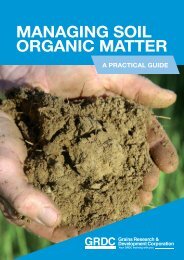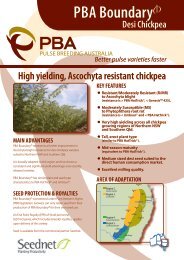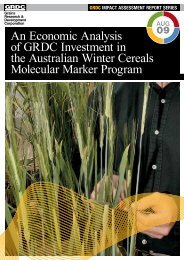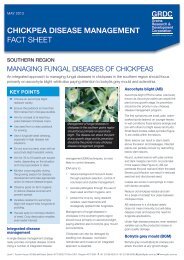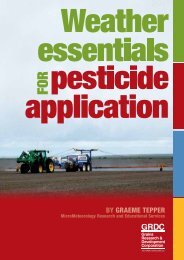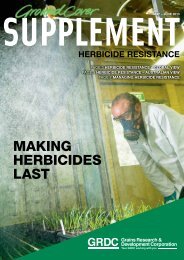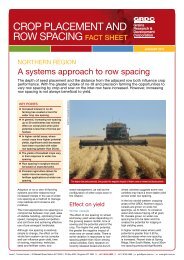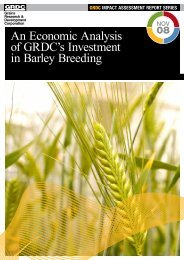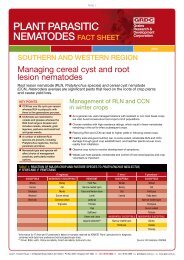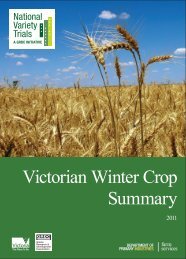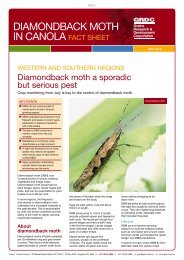impact assessment report series - Grains Research & Development ...
impact assessment report series - Grains Research & Development ...
impact assessment report series - Grains Research & Development ...
You also want an ePaper? Increase the reach of your titles
YUMPU automatically turns print PDFs into web optimized ePapers that Google loves.
Executive Summary<br />
The Soil Biology Program was developed by the GRDC Board in 2002 as a new<br />
initiative. The goals set by the Board included overcoming biological constraints and<br />
managing soil biology as an integral part of sustainable farming systems. These<br />
were to be achieved by practical methods and products to improve profit margins.<br />
The cluster of projects evaluated included the parts of the Soil Biology Program on<br />
inoculants, root diseases, and organic matter and nutrition. The projects contributed<br />
to the Board’s goals by developing products and practices expected to contribute to<br />
more profitable and sustainable crop production. Most of the economic benefits<br />
evaluated were those anticipated from increased yields following the application of<br />
microbial inoculants. The benefit/cost ratio based on the best available estimates<br />
was 4 to1. The GRDC investment in the cluster to be evaluated totalled $8.1 million<br />
generating a net present value of benefits of $32 million. Partner organisations,<br />
which were mostly from a centre of concentration in soil biology research in<br />
Adelaide, contributed $8.5 million. The evaluation allowed for an estimated $9<br />
million of post-project costs for further research and development of the outputs of<br />
the cluster.<br />
The economic evaluation showed that the majority of the benefits are expected to be<br />
from increased profits from two phosphate-solubilising inoculants including a dualpurpose<br />
product that also includes rhizobia for nitrogen fixation. The phosphatesolubilising<br />
inoculant Penicillium bilaii (marketed as JumpStart) is a naturally<br />
occurring fungus. Applied as a seed dressing, the fungus grows along plant roots<br />
producing acids that release less available forms of Phosphorous. The availability of<br />
phosphates is a major constraint to agricultural production across much of southern<br />
Australia. Further profits are likely from an inoculant to reduce the <strong>impact</strong>s of root<br />
diseases and from research that will help to better define seasonal fertiliser<br />
requirements based on the capacity to simulate nutrient cycles for Nitrogen and<br />
Phosphorus.<br />
Additional environmental benefits are expected from reductions in fertiliser and<br />
fungicide use. However the phosphate solubilising inoculant will only be a partial<br />
substitute for phosphate fertiliser. Overall this will result in small improvements in<br />
water quality from reduced off-farm export of nutrients. In terms of the<br />
environment life cycle on farm, there will be small positive contributions to more<br />
sustainable development from reduced inputs of fertilisers and fungicides. The<br />
carbon contribution is also likely to be minor and related to some organic matter<br />
increase associated with increased yields.<br />
The major social benefit is likely to arise from the improved research capacity in soil<br />
biology. The GRDC investment was a catalyst leading to the development of a more<br />
coherent national effort. Soil biology was a relatively neglected field compared to<br />
the traditional focus on soil chemical and physical research.<br />
The economic benefits were determined by the increased profits from the use of<br />
inoculants and better defined fertiliser requirements. As only one product from the<br />
program was being marketed by 2009, there was considerable uncertainty in relation<br />
to the likely yield increases and rates of adoption. The inoculants are being<br />
commercialised by a GRDC joint venture (Novozymes Biologicals Australia). Much of<br />
_________________________________________________________________<br />
Agtrans <strong>Research</strong> Page 3




